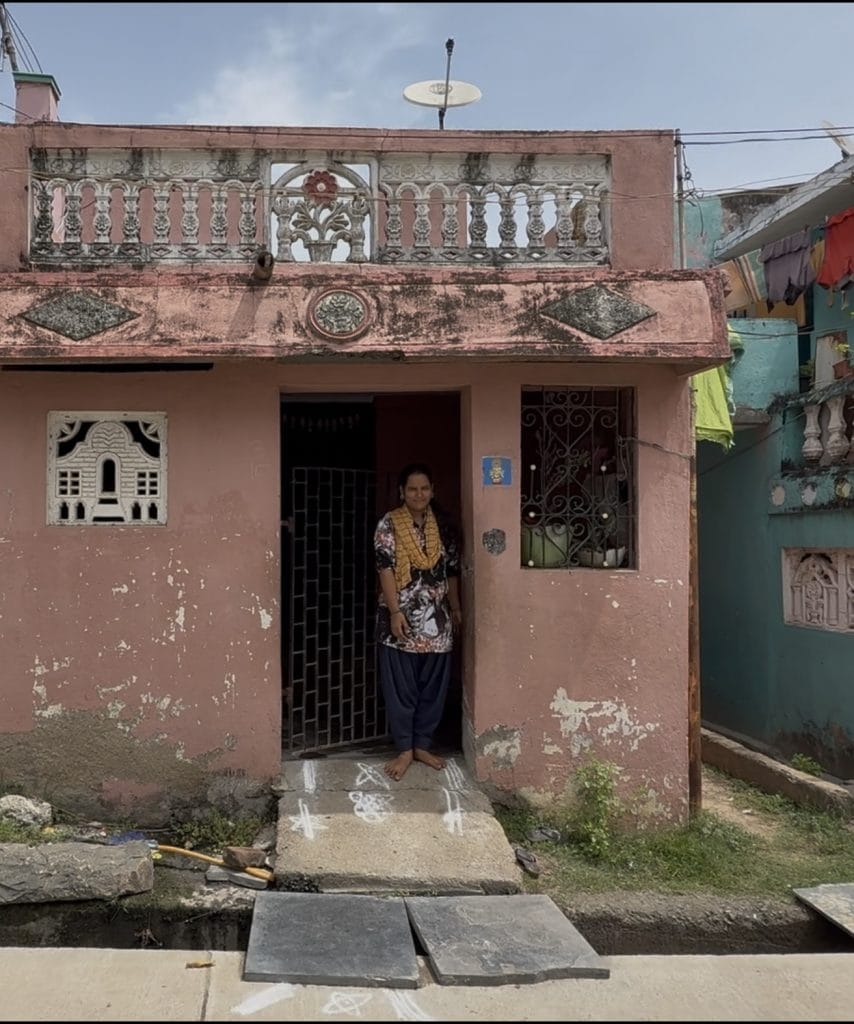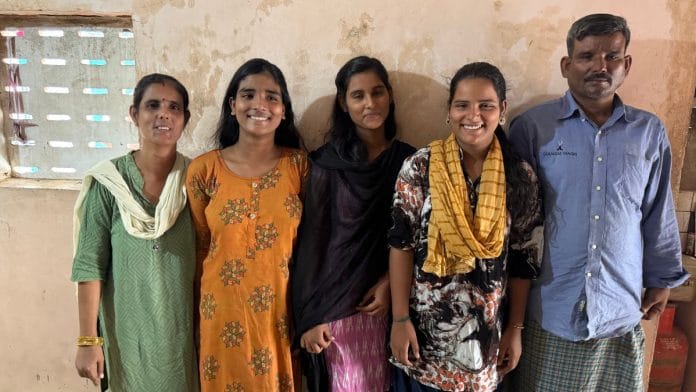Chennai: Six years ago, when Jiya Kumari was visiting her native village in Bihar, her Tamil fluency became a cause of jealousy for her relatives. They assumed Jiya and her sisters were icing them out by purposefully talking in a language they didn’t understand.
“The fact is, Tamil just comes in the flow,” her older sister, 17-year-old Riya, told ThePrint, sitting in her single-room house near Pallavaram, on the outskirts of Chennai.
The daughter of a daily wager who migrated from Bihar around 17 years ago, Jiya made headlines recently after topping the Class X Tamil exam. Soon, Union Education Minister Dharmendra Pradhan cited Jiya’s achievement at the Bharatiya Bhasha Summer Camp. Pradhan dedicated the event to Jiya for scoring 93 out of 100 in Tamil. His statement comes amid a bitter war between the Centre and Tamil Nadu over the DMK government’s refusal to implement certain aspects of the National Education Policy. The state sees the three-language policy as a bid to impose Hindi.
Sixteen-year-old Jiya Kumari stands proudly at the doorstep of her house, decorated with traditional kolam designs, a skill she mastered after her family relocated to Tamil Nadu.
The sisters stood strongly against the imposition of Hindi. “It would be unfair to expect people here to learn Hindi just to communicate with us. No one from Tamil Nadu who goes to north India and expects people to speak in Tamil to them,” said Supriya.
Jiya’s father, Dhananjay Tiwari, and her mother, Reena Devi, originally Bhojpuri speakers, migrated from Bihar’s Siwan district to Chennai in Tamil Nadu around 17 years ago for construction work.

Jiya cleared the Class X board exams with 467 marks out of 500. She is not the first member in the family to have learnt Tamil in school. Jiya’s elder sister, Riya Kumari, who is now pursuing her Class XII, had also cleared her Class X exam with Tamil as the second language.
“I am studying Tamil, and I also cleared my Class X exam in Tamil, scoring over 80 marks. But only Jiya is known to all. We are happy that we’re finally being recognised for learning Tamil,” said Riya. Supriya Kumari, the youngest of the three, is also fluent in Tamil. Their mother, Reena, too, learnt Tamil and speaks the language with a Bhojpuri accent.
While Riya is planning to pursue an engineering degree after her Class XII, Jiya wants to pursue medicine.
Reena credited the people of Tamil Nadu for teaching her Tamil.
“Ever since I came to Chennai some 17 years ago, not even once have I been seen as an outsider. In the early days, even when I struggled to speak in Tamil, the shopkeepers tried to understand what I was asking and helped me with it. Only with the help of the neighbours, I learnt Tamil here,” said Reena.
Reena’s husband, Dhananjay, who works as a welder for a daily wage of Rs 700, can understand Tamil but finds it difficult to speak the language.
“Let it be at work or at home, there was no need to speak in Tamil since most of my bosses at work know Hindi. My colleagues were also from Northern states and could speak Hindi. Hence, I did not think about it, but I can understand Tamil,” said Dhananjay.
Also read: Delhi’s Women’s Football League has lawyers, teachers, mothers as players. It’s a safe space
‘Chennai safe for girls’
For the migrant family, Tamil is not just a language. It’s a bridge to better opportunities that they would not have accessed back home in Bihar.
“I doubt that all my children would have reached high school and higher secondary school had they been in Bihar,” Reena told ThePrint. Dhananjay added that there was no safety for women in his home state.
“Schools are not accessible in the villages there. Pre-school and primary schools may be there in villages, but even for high school, we have to travel for about 10 to 15km and for higher secondary, we have to travel to the city, which is unsafe there for girl children,” said Dhananjay.
Reena is thankful to the Tamil Nadu government’s mid-day meal scheme and free uniform scheme, shoes and books.
“I only feel the burden now since the free uniform scheme is only till Class VIII. My youngest daughter is moving to Class IX, and Jiya is going to higher secondary. So, we have to get uniforms for them. Had it not been Tamil Nadu government’s schools, I don’t know how I would have made them study with the meagre amount of Rs 10,000 he earns and Rs 7,000 I earn,” Reena said.
Supriya, the youngest among all, is not just fluent in Tamil, but has picked up Chennai slang, which makes it even more difficult for anybody to tell that she’s from Bihar.
“Jiya was just a few months old when we came to Tamil Nadu, and her elder sister Riya Kumari was just two years older than her. More than Riya and Jiya, Supriya is pretty much a Tamil girl. She was born and raised in Tamil Nadu,” said Reena
The family has also adapted to the culture of not using their surname.
“We do not see anybody here with a surname, like my husband has Tiwari, for instance. We do not get why people don’t use surnames,” said Reena, unaware of the Dravidian movement that pushed people to reject surnames in the state.
Reena has avoided giving surnames to her daughters. “I don’t know. People here don’t have their surnames, so I let my children also go without surnames. After marriage, if they want to have surnames, let them add.”
(Edited by Theres Sudeep)







Whats new here? In my school days in late 80s, not only did I, a Keralite, scored first in Tamil in the boards but, in all the Tamil oratorical competitions also either myself or another Keralite girl used to get the first prize! The first generation ones who were brought up in a state were not any different from the others who were in the state for generations. That’s how it has been. Only now, all these things have become a big deal due to proliferation of “cbse schools” which are (or were?) able to get away with running the school without anyone needing to learn the state language!
Migrant workers and their children learn the local language very fast due to necessity of communicating in it. This is true in whole India.